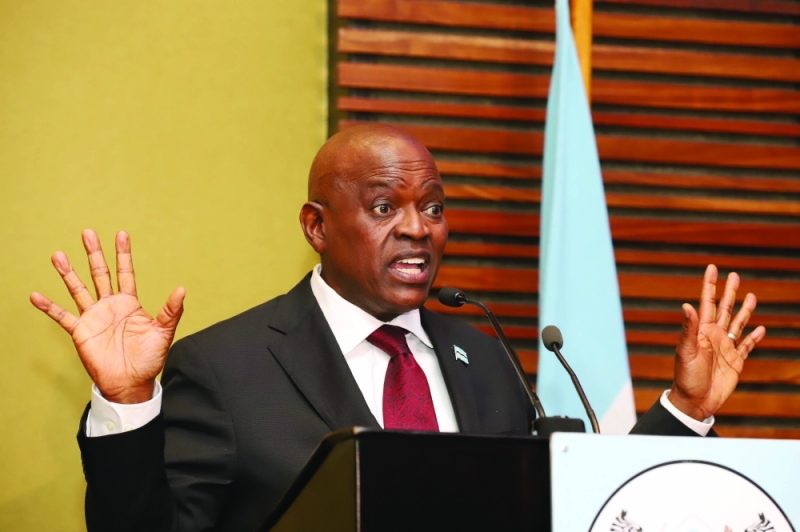I was ready to walk away from De Beers – Masisi
Lewanika Timothy | Monday April 8, 2024 06:00


Botswana’s diamonds are not just shiny stones concealed by the Sahara sands that drape the turf of the nation’s territory, they are the roads coiled all over the nation, the buildings that house the country’s industrialisation efforts, diamonds built and made the nation. It is a bare truth, but President Masisi was ready and willing to walk away from the relationship that ensured this development, ready to send packing the biggest commercial partner the country has proving to be gatvol of a deal that he claims robbed Botswana for decades upon decades.
“I told the CEO of Anglo and De Beers that if they come back thinking we will sign the same deal, they better get out of my Cabinet room and the deal is off,” he said. These spine-chilling words to the average Motswana who has for many years been in the dark over the details of the agreement that keeps the whole economy running. But for Masisi there is nothing spine-chilling about letting Batswana know the dark side of the deal that sustains their economy. In 2020 at the height of COVID-19, the President watched together with his administration, as the pandemic set ablaze the manifesto and promises he had campaigned with and won, replacing that hope for Batswana with the second worst economic collapse in the country’s history, the depletion of critical government savings and an embittered population. The kitty was empty with no hope of being replenished soon and the government had to find more ways to generate more cash for the future.
A successful renegotiation of the country’s most important economic relationship, the one with De Beers, would deliver not only greater budget revenues, but power the RESET and transformation agendas Masisi’s administration is banking on to evolve the economy from resource to knowledge-based.
“It was a bad agreement, it was bad for Botswana. We got too little and De Beers got far too much out of a bad agreement. It was based on a lack of knowledge and sophistication in negotiating deals on our side. “We were taken advantage of by our very own partner,” he said.
One area Masisi has been pursuing, according to statements he made as far back as 2018, when he took office, is for Botswana to secure greater access to the values in the diamond industry’s pipeline, beyond simply being a miner of the precious stones.
The biggest worry for Masisi is the clause that prohibited Botswana from participating in the diamond value chain beyond the sale of rough of diamonds. In earlier remarks he wanted the world to come to Botswana, to set up a vertical integration model for diamond development.
“The whole value proposition of beneficiation of diamonds revolves around jobs, the diversification of the economy,” Masisi told Bloomberg in an interview in May 2018.
“Why take them far away?
“So the very things that cause them to be processed elsewhere, we want to get to the underlying reasons for that, the attractions and bring them to Gaborone.” The government’s agitation with De Beers would later prompt the former to take up 24% equity in HB Antwerp and provide the firm with a portion of the Okavango Diamond Company’s (ODC) rough diamond supply for five years. Last year, Masisi revealed that the deal was an opportunity for the country to benefit from the money to be made from the diamond downstream industry, including cutting and polishing, a prospect that Masisi says it did not have under previous agreements with De Beers. “HB is not a mining company. It operates in the luxury goods space. It value adds, but it’s unique attribute chasing after targeted clientele, it’s purpose-driven and very unique in its attributes. It does not mining and no interest in any mine, but it relates. “It takes product from the miner and makes a difference to the countries from which the goods come. That is it’s purpose, find me a company that’s similar and if there’s an opportunity to invest, we may invest,” he said.
Masisi is the first President to be so open and forthcoming about the diamond deal negotiations, and perhaps one of the key highlights of his presidency which will form part of his campaign tactics going into the 2024 polls. Despite this forthcoming nature of Masisi the deal remains far beyond comprehension for the average Motswana, a secret trade deal despite its bearing on Botswana’s economy.
